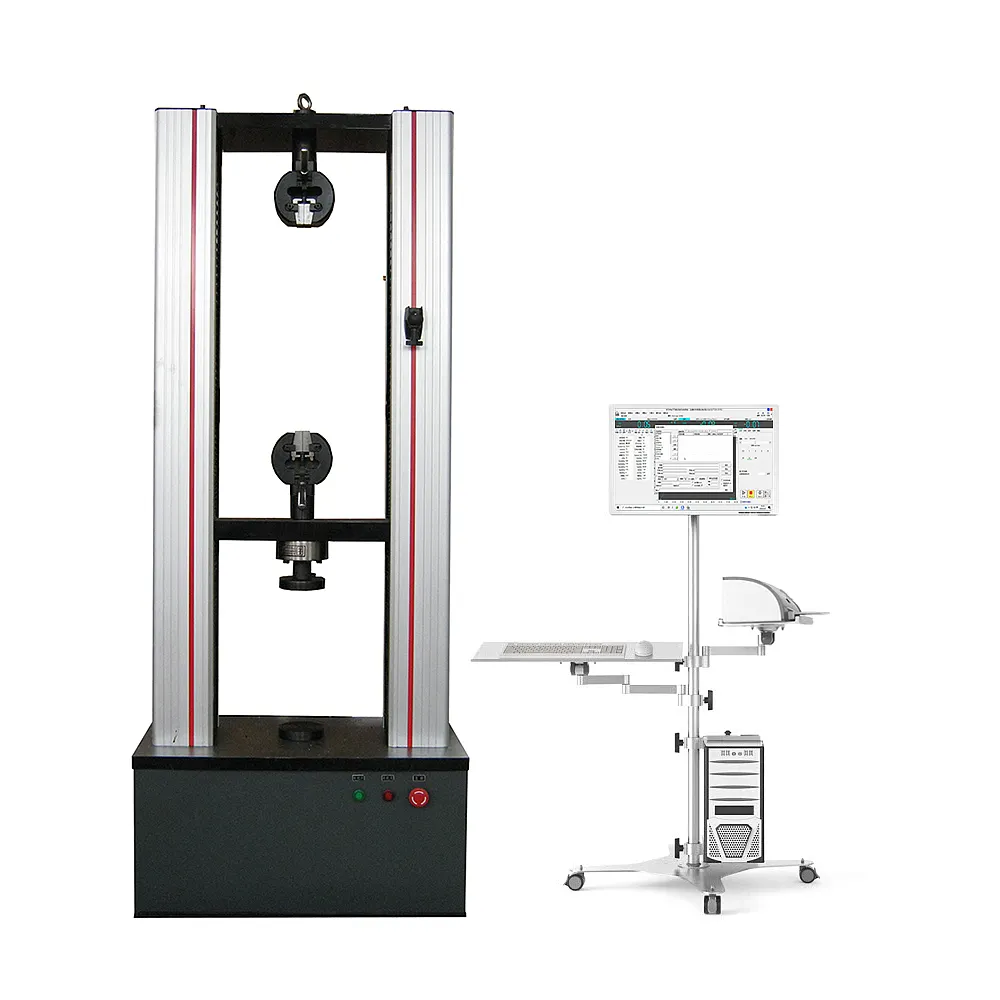Strength test machines are used to evaluate the mechanical properties of a wide range of materials.
Here are some common materials that are frequently tested using strength test machines:
Metals: Strength testing of metals is crucial in industries such as manufacturing, construction, and aerospace. Commonly tested metals include steel, aluminum, copper, titanium, and their alloys. Tensile strength, yield strength, elongation, and hardness are some of the key properties evaluated.
Plastics: Strength testing of plastics is important in industries like automotive, packaging, and consumer goods. Different types of plastics, such as polyethylene, polypropylene, polycarbonate, and ABS (Acrylonitrile Butadiene Styrene), undergo tests like tensile testing, flexural testing, and impact testing to determine their strength, stiffness, and behavior under load.
Composites: Composite materials, which consist of a combination of two or more materials, are commonly used in aerospace, automotive, and sports equipment industries. Strength testing is crucial for assessing the performance of composite materials like carbon fiber reinforced polymers (CFRP) and fiberglass composites. Tensile, compression, and flexural tests are performed to evaluate their strength, stiffness, and failure behavior.
Concrete and Cementitious Materials: Concrete is extensively tested for its compressive strength, flexural strength, and other mechanical properties. Cementitious materials like mortar and cement are also tested using strength test machines to ensure their quality and performance in construction applications.
Wood and Timber Products: Strength testing of wood and timber products is important in industries such as construction, furniture, and manufacturing. Tests such as bending, compression, China strength test machine and tensile tests are performed to assess properties like modulus of elasticity, compression strength, and tensile strength.
Rubbers and Elastomers: Rubber materials used in various applications, including automotive components, tires, and seals, undergo strength testing to determine properties like tensile strength, elongation, tear resistance, and compression set.
These are just a few examples of the materials commonly tested using strength test machines. The specific types of tests performed may vary depending on the material and its intended application. Strength testing is conducted to ensure the quality, performance, and safety of materials in their respective industries.
What are some other mechanical properties that can be evaluated using strength test machines?
In addition to strength, there are several other mechanical properties that can be evaluated using strength test machines.
Here are some common properties that can be assessed:
Elasticity and Modulus of Elasticity: These properties describe a material’s ability to deform under stress and return to its original shape when the stress is removed. The modulus of elasticity, also known as Young’s modulus, measures the stiffness of a material. Tensile and compressive tests are commonly used to determine these properties.
Hardness: Hardness is a measure of a material’s resistance to indentation or scratching. Different hardness tests, such as Rockwell, Brinell, or Vickers, can be performed using specialized indenters and loads to evaluate the hardness of metals, plastics, and other materials.
Ductility: Ductility refers to a material’s ability to deform plastically without fracturing. Tensile tests are often used to determine the ductility of materials by measuring properties such as elongation and reduction in area.
Toughness: Toughness represents a material’s ability to absorb energy and deform plastically before fracturing. It is determined by evaluating the area under the stress-strain curve during a tensile or impact test.
Fatigue Strength: Fatigue strength assesses a material’s resistance to repeated cyclic loading. Fatigue tests involve applying cyclic loads to a specimen until failure to determine its endurance limit or fatigue life.
Creep Resistance: Creep refers to the time-dependent deformation that occurs under a constant load or stress. Creep tests involve subjecting a specimen to a constant load or stress over an extended period to assess its resistance to this phenomenon.
Fracture Toughness: Fracture toughness measures a material’s ability to resist crack propagation. Tests such as the Charpy impact test or the fracture toughness test (e.g., the KIc test) are performed to evaluate how well a material can withstand cracks or fractures.
Shear Strength: Shear strength represents a material’s resistance to forces that cause sliding or deformation along parallel planes. Shear tests assess the maximum shear stress a material can withstand before failure occurs.
These are just a few examples of the additional mechanical properties that can be evaluated using strength test machines. The specific tests performed will depend on the material, industry standards, and the desired information about the material’s behavior under different loading conditions.

